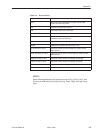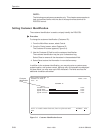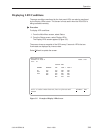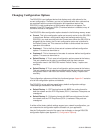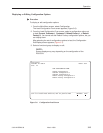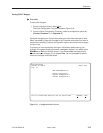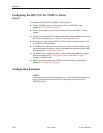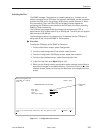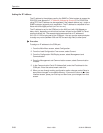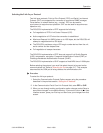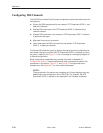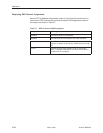
Operation
3-17
3162-A2-GB20-30
March 1999
Selecting the Port
The SNMP manager, Telnet device, or network device (e.g., a router) can be
directly connected to the COM port. An external LAN Adapter can be connected
to either the COM port or the auxiliary (AUX) port to provide Ethernet or Token
Ring connectivity. Also, the DSU/CSU can be daisy chained together by
connecting the COM port of one device to the AUX port of the other, providing
SNMP or Telnet connectivity.
The COM port can support either synchronous or asynchronous PPP, or
asynchronous SLIP at data rates of up to 38,400 bps. The AUX port can support
data rates up to 38,400 bps.
The following procedure is an example only. It assumes that the COM port is
being used as the link to the SNMP or Telnet system.
" Procedure
To select the COM port as the SNMP or Telnet link:
1. From the Main Menu screen, select Configuration.
2. From the Load Configuration From screen, select Current.
3. From the Configuration Edit/Display screen, select User Interface.
4. From the User Interface screen, select Communication Port.
5. In the Port Use field, enter Mgmt (Figure 3-9).
6. When you are through making configuration option changes, select Save to
store these changes in nonvolatile memory. If you want to return to the User
Interface screen, press your Esc key and then save your changes from that
screen.
main/config/user/com
Customer ID: Node A Model: 3162
Slot: xx
COMMUNICATION PORT OPTIONS
Port Use: Mgmt
Port Type: Synchronous
Clock: Internal
Data Rate (Kbps): 9.6
––––––––––––––––––––––––––––––––––––––––––––––––––––––––––––––––––––––––––––––––
Ctrl-a to access these functions, ESC for previous menu M
ainMenu Exit
S
ave
Port Use
Field
Figure 3-9. Configuration Save Screen



